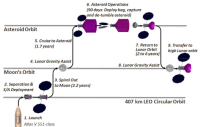To mine the asteroids, first build small cheap space telescopes.
The space telescope will be based on the same design Planetary Resources will eventually use for its asteroid-prospecting spacecraft: a 30-kilogram to 50-kilogram flier packed with imaging sensors and a laser-optical communication system the company is developing to avoid encumbering its spacecraft with large antennas. The company, which says it has about two dozen employees, will market these spacecraft as cheap but effective telescopes for both astronomical and Earth-observing applications. Sales would provide cash for the company’s core work on asteroid mining, Eric Anderson, co-founder and co-chairman of Planetary Resources, said.
The telescope slated for launch sometime in the next two years “would be something, let’s say, a university buys [for astronomical observations], or a commercial company that wants to monitor shipping traffic or something like that,” Anderson said in a phone interview. The cost for the telescope, which Planetary Resources is calling Arkyd-101, would be “millions of dollars, including launch.”
At the Planetary Resources press conference today, there was a lot of talk about the benefits and profits to be gained from mining the asteroids. However, this ain’t gonna happen for quite a few years. In the meantime, the company plans to make money building space telescopes which scientists and others can use, for a fee, to do research.
In other words, the government and astronomers dropped the ball on replacing the Hubble Space Telescope. Now, private enterprise is going to pick it up and run with it.

